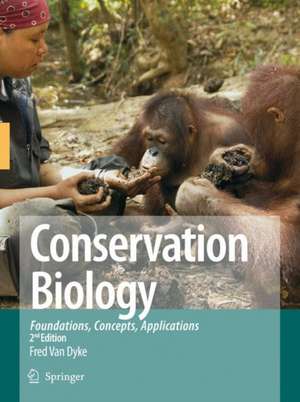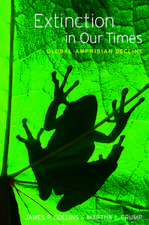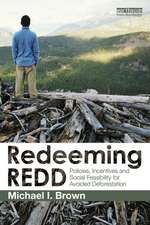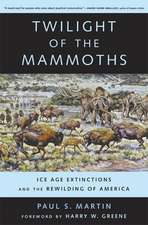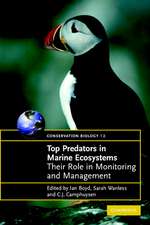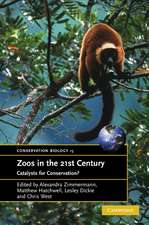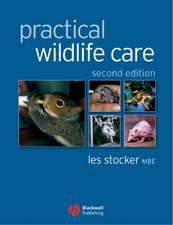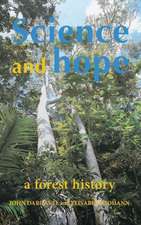Conservation Biology: Foundations, Concepts, Applications
Autor Fred Van Dykeen Limba Engleză Hardback – 29 feb 2008
Presenting key information and well-selected examples, this student-friendly volume carefully integrates the science of conservation biology with its implications for ethics, law, policy and economics. In addition to rigorous examination of the scientific theory supporting conservation biology and its applications, this unique book includes a number of features which set it apart from others. These include its chapters on aquatic conservation, landscape ecology, and ecosystem management, and its direct explanation and invitation to students on how to enter the work of conservation as a professional and personal vocation.
Aimed primarily at undergraduates studying courses in conservation and conservation biology, this book will also be useful to practicing conservationists and natural resource managers.
| Toate formatele și edițiile | Preț | Express |
|---|---|---|
| Paperback (1) | 517.95 lei 6-8 săpt. | |
| SPRINGER NETHERLANDS – 6 noi 2010 | 517.95 lei 6-8 săpt. | |
| Hardback (1) | 570.54 lei 38-44 zile | |
| SPRINGER NETHERLANDS – 29 feb 2008 | 570.54 lei 38-44 zile |
Preț: 570.54 lei
Preț vechi: 704.37 lei
-19% Nou
Puncte Express: 856
Preț estimativ în valută:
109.19€ • 118.56$ • 91.72£
109.19€ • 118.56$ • 91.72£
Carte tipărită la comandă
Livrare economică 19-25 aprilie
Preluare comenzi: 021 569.72.76
Specificații
ISBN-13: 9781402068904
ISBN-10: 1402068905
Pagini: 508
Ilustrații: XXX, 478 p.
Dimensiuni: 210 x 279 x 33 mm
Greutate: 1.52 kg
Ediția:2nd ed. 2008
Editura: SPRINGER NETHERLANDS
Colecția Springer
Locul publicării:Dordrecht, Netherlands
ISBN-10: 1402068905
Pagini: 508
Ilustrații: XXX, 478 p.
Dimensiuni: 210 x 279 x 33 mm
Greutate: 1.52 kg
Ediția:2nd ed. 2008
Editura: SPRINGER NETHERLANDS
Colecția Springer
Locul publicării:Dordrecht, Netherlands
Public țintă
GraduateCuprins
The History and Distinctions of Conservation Biology.- Values and Ethics in Conservation.- The Legal Foundations of Conservation Biology.- Biodiversity: Concept, Measurement, and Challenge.- Biodiversity Conservation and Climate Change.- Genetic Diversity – Understanding Conservation at Genetic Levels.- Genetic Management – Managing Genetic Diversity for Conservation Goals.- The Conservation of Populations: Concept, Theory, and Analysis.- Population Management and Restoration.- The Conservation of Habitat and Landscape.- The Conservation of Aquatic Systems.- Ecosystem Management.- Conservation Economics.- On Becoming a Conservation Biologist: The Things Textbooks Never Tell You.
Recenzii
From the reviews of the second edition:
"This book … give a unified approach to an interdisciplinary subject, discussing the historical, ethical, economical, and ecological basis of conservation biology. … The overall mission of the textbook to provide undergraduates with a stimulating and accessible text is executed with great success. … it finds a wide readership and is present in libraries of colleges and research institutes." (Mark Young, British Ecological Society, Vol. 39 (4), 2008)
"This book … give a unified approach to an interdisciplinary subject, discussing the historical, ethical, economical, and ecological basis of conservation biology. … The overall mission of the textbook to provide undergraduates with a stimulating and accessible text is executed with great success. … it finds a wide readership and is present in libraries of colleges and research institutes." (Mark Young, British Ecological Society, Vol. 39 (4), 2008)
Notă biografică
Fred Van Dyke is a professor of biology at Wheaton College (Illinois). He has previously served on the faculties of Northwestern College (Iowa) and the Au Sable Institute for Environmental Studies, as a wildlife biologist for the Montana Department of Fish, Wildlife and Parks, as a scientific and professional consultant to the U. S. National Park Service, the U. S. Forest Service, the Pew Charitable Trust, and to various private environmental and conservation consultants. He is the author of numerous publications on animal home range and habitat use, management and conservation of animal populations, management of successional processes to conserve habitat, and conservation values and ethics.
Textul de pe ultima copertă
Fred Van Dyke’s new textbook, Conservation Biology: Foundations, Concepts, Applications, 2nd Edition represents a major new text for anyone interested in conservation. Drawing on his experience as a conservation biologist, college teacher, and successful textbook author, Van Dyke’s organizational clarity and readable style make this book an invaluable resource for students in conservation around the globe.
Presenting key information and well-selected examples, this student-friendly volume carefully integrates the science of conservation biology with its implications for ethics, law, policy and economics. In addition to rigorous examination of the scientific theory supporting conservation biology and its applications, this unique book includes a number of features which set it apart from others. These include its chapters on aquatic conservation, landscape ecology, and ecosystem management, and its direct explanation and invitation to students on how to enter the work of conservation as a professional and personal vocation.
Aimed primarily at undergraduates studying courses in conservation and conservation biology, this book will also be useful to practicing conservationists and natural resource managers.
Presenting key information and well-selected examples, this student-friendly volume carefully integrates the science of conservation biology with its implications for ethics, law, policy and economics. In addition to rigorous examination of the scientific theory supporting conservation biology and its applications, this unique book includes a number of features which set it apart from others. These include its chapters on aquatic conservation, landscape ecology, and ecosystem management, and its direct explanation and invitation to students on how to enter the work of conservation as a professional and personal vocation.
Aimed primarily at undergraduates studying courses in conservation and conservation biology, this book will also be useful to practicing conservationists and natural resource managers.
Caracteristici
A skillfully written, readable style that permits students to re-create the intellectual process of connecting empirical studies with conceptual theories and models to reaching conclusions and insights needed for conservation application and management Presentation of and original insight on the latest developments in conservation theory and application Strong organizational coherence with logical flow and transition from chapter to chapter Student-friendly pedagogy that emphasizes the learning process, not simply information presentation Well-integrated context and synthesis of the science of conservation biology with its implications in ethics, law, policy, and economics that engages students on multiple intellectual levels
